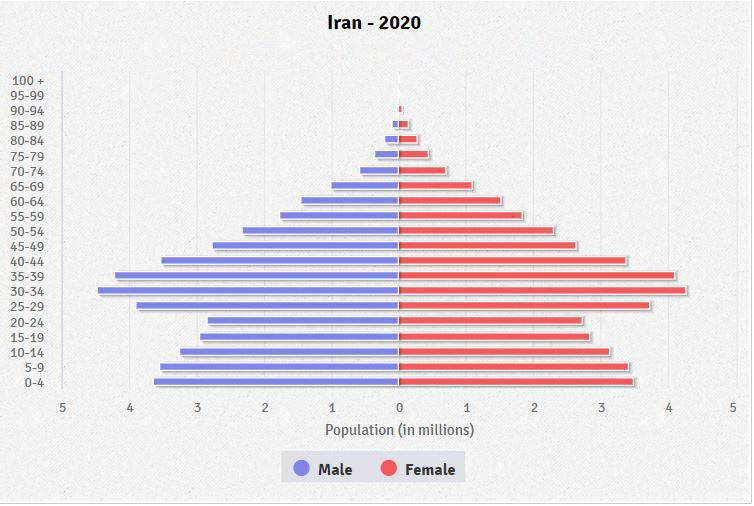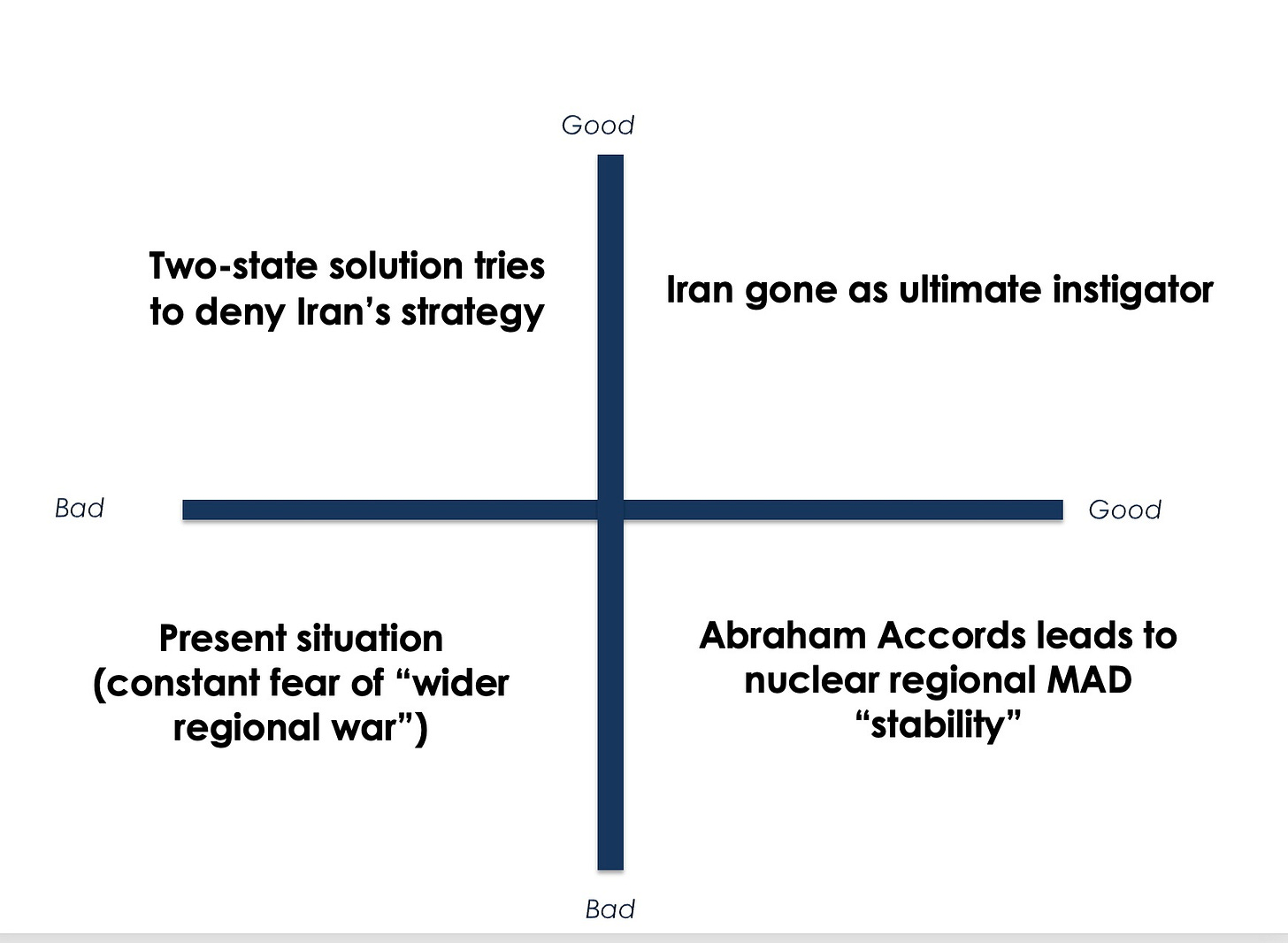Israel's desired regional ending-of-state
Regime change in Iran is the proximate/ultimate/only solution
Let me cut to the chase:
There is no two-state solution for Israel and Palestine so long as Iran is antagonizing and targeting Israel, both directly and more so through its proxies (Hamas, Hezbollah, Houthis, etc.).
Ergo, the quickest way to the two-state solution is regime change in Tehran.
The rest is a lot of hot air, doomed diplomacy, and endless op-eds.
You want peace in the Middle East?
It begins with regime change in Iran — however achieved.
Now, just hold that truth in your mind before you start sputtering your justified fears of some neocon push within the USG to make this happen, because that ambition simply does not exist in DC — outside, say, of John Bolton … the man, the mustache, the legend.
I’m making a simple point here: So long as the Islamic Republic exists in Iran, the US and the West in general are being highly unrealistic about any two-state solution. In fact, the second I hear those words coming out of some diplomat/politician’s mouth, I know that they are completely unserious about that chimera of a goal.
It’s just what you say when you have nothing to say — the non-solution solution, the non-answer answer … perchance the JDVancer.
So long as Iran backs Hamas and Hezbollah, Israel is completely incentivized to continue diminishing both Gaza and the West Bank through creeping settlements, buffer zones, security corridors, and the like — erasing the symptom when it cannot eliminate the cause.
Again, the rest is all talk. I have never read a two-state solution proposal I didn’t find borderline ludicrous — as in, why would Israel ever go for this?
Radical acceptance means practicing a conscious effort to acknowledge and honor difficult situations and emotions. Fully accepting things as they are, instead of ignoring, avoiding, or wishing the situation were different, can be a critical step in moving through a difficult experience to experiencing more meaning.
So, let’s just accept that reality. Radical acceptance (therapy term) here means you stop with the pressuring of Israel regarding its actions in Gaza and the West Bank. Absent dealing with the ultimate threat of Iran, that’s all just a waste of time and mostly hypocritical. There’s no way Israel accepts neighbors hellbent on its destruction and financed by a hostile Shia regime — again, a larger reality only explained by Tehran’s regional ambitions that virtually NOBODY in the region or wider world welcomes.
So there you have it: overwhelming regional/global opposition to Iran’s ambitions, which cannot be quelled without the fall of the Islamic Republic, which needs such an enemy-image for its continued survival vis-a-vis its own unhappy and restive population (who only grow more unhappy and restive as a huge youth bulge, mistakenly educated by the government, settle into disgruntled middle-age-dom while the nation’s fertility rate [1.66] plummets).
Trust me, this is not a stable look in demographic terms. This is a demographic dividend being wasted, heading for a silver tsunami amidst a changing climate that is devastating the ag sector there (dust storms, desertification, 30% loss of precipitation, growing water scarcity, no modernization). Iran has no future on its current path, other than to become another North Korea (a threat to the world, a pain in the ass to its patrons, and useful only to fellow pariah states).
So, again, let’s take stock: no peace for Israel so long as Iran remains Iran, and Iran remaining Iran isn’t looking good.
To me, that broad framing says one thing: get rid of the Islamic Republic.
The region, left to its own devices, is naturally moving toward an isolate-Iran stance via the proposed Abraham Accords, which the US supports. So, long term, we know where this is headed. It’s just that, on this path, Iran is totally incentivized to make life as horrible as possible for Israel to stave off/delay this emerging Sunni-Israeli alliance’s codification. Iran is also super-incentivized to reach for the Bomb, which nobody wants either.
At the very least, the US and West should be all about pushing those accords along at the earliest possible moment — regardless of Israel’s actions in the Strip, West Bank, or anywhere else in the region, to include direct attacks on Iran.
The weird truth is, despite all the tumult Israel is now generating with its aggressive confrontation across the entirety of the Axis of Resistance, none of this is all that bad to the world’s geopolitical concerns. Iran is the primary threat to the region’s stability, its capacity to export energy, and its future dreams of deepened connectivity with the global economy. Iran is THE problem on all those scores, so Israel diminishing that problem by taking the fight directly to Iran is … fine for the world’s larger purposes and ambitions, whereas any two-state solution sought as interim solution is a complete waste of time because it will not get the world what it wants in the region, which is Israel at peace with itself/Palestine, Israel at peace with the Sunni Arab world, and revolutionary Iran diminished/eliminated as a threat to those two worthy goals.
What happens when the Islamic Republic falls and is replaced by a reformist government intent on ending Iran’s isolation?
Most of Israel’s problems get a whole lot lighter and/or go away.
Shia Iran’s focus on Israel has always been a mere means to the ultimate end of achieving recognition as leader of the Muslim world — a crown likewise claimed by, and more widely recognized as, Sunni Saudi Arabia. There’s no way a Shia power can legitimately make that claim, much less achieve such power, in a predominately Sunni Middle East (85%-90%). So Iran, presently configured, is only and always a source of instability — nothing more and nothing less.
Iran is 90% Shia, and thus has natural affinity with majority Shia populations concentrated in Iraq and Bahrain. Then there’s Baathist Syria, with whom Iran has had a strong alliance dating back to the 1979 revolution. To me, that’s a controllable problem if you have Sunni Arab regimes on your side, which we now do.
As for the rest of the Middle East?
The Saudis (90% Sunni), would, of course, welcome the end of the Islamic Republic. Same for UAE. Both have great ambitions for the future of their countries, and Iran only complicates those.
Oman (a mere 5% Shia), the mediator, would be neutral at worst.
Similarly mediator-focused Qatar (80% Sunni), which carefully balances relations with fellow GCC members with its strong military ties to the US, could live with it, or certainly wouldn’t go to any mattresses over it. There is a shared hydrocarbon field to worry about, but not much else.
Careful Kuwait (75% Sunni) would be similarly more concerned over regional stability than the fate of a fallen Islamic Republic.
Jordan (95% Sunni) , already burdened with so many Palestinian refugees over the decades, would welcome a reduced/erased Iranian threat across the region, something it has worked for over the years.
Sunni Turkey (80% Sunni) would welcome the diminishment of a geopolitical rival, along with the possibility of further securing itself against Kurdish insurgents along their shared border.
Sunni Egypt (90%) would be similar to Turkey: no tears for a complicating Shia rival who has only made trouble for Cairo with regard to Gaza.
Sunni-dominant Libya and Tunisia would welcome less Iranian interference and meddling in their internal affairs (actual/potential support for insurgent groups), and Algeria would remain its usual neutral self.
How about Pakistan (85% Sunni)? Shared border issues would be more easily managed, as would Islamabad’s preference for the Saudis over the Iranians in regional geopolitics. In short, life could easily get easier for Pakistan if Iran lost its troublemaking mojo.
Hindu-dominant India would approach the situation with its usual caution, but it has gone out of its way under Modi to improve relations with the Gulf monarchies and Israel. Would it access Iranian oil post-Islamic Republic? Don’t see why it wouldn’t.
The same could be said of China, which would probably have to pay more than it does today for sanctioned Iran’s oil exports, and yet, who would likely step in more to modernize Iran’s oil production than Beijing following any regime change? Beijing cares only about the stability of its oil imports. A pleasantly corrupt secular regime in Tehran would be most welcome as a long-term development.
Yes, China would rail against the “loss” of a sort-of ally, but that would be perfunctory. China wants a stable PG and Iran is all about an unstable PG.
Anti-Western Russia, of course, would be solidly against the change, because a meddling Iran in the PG keeps oil prices higher than they otherwise would be, to Moscow’s benefit (such as it can capitalize on that, which isn’t much right now). Like Tehran’s ayatollahs, Putin’s regime needs conflict with the West to justify — to its own people — its godawful governing performance at home.
Europe, while fretting over potential instability, would welcome the change. Iran is the only regional power that points its missiles at European capitals, so — of course — the EU and NATO would welcome the end of the regime.
Add it all up and the vast majority of players would be good with a post-Islamic Republic Iran, assuming the accompanying instability wouldn’t escape the collective efforts of regional players to keep a lid on things while positively engaging the new regime. Certain powerful elements in Iran would need to bought off, most notably the IRGC (Islamic Revolutionary Guard Corps) military-industrial complex, but there are ways to co-opt such institutions under the right fluid circumstances.
Now, understand, nobody in their right mind would advocate some sort of US-led military coalition going into Iran to effect a regime change: too big and too hard.
My point here is not to advocate for that but simply to highlight the enduring reality that, so long as the Islamic Republic lives on, its prime directive remains its manufactured existential struggle with Israel. I say “manufactured” because, historically speaking, there is no cause for Shia-Jewish tension per se — just the opposite as two minority religions.
Revolutionary Iran chose to make Israel its Enemy #1 solely to press its case for revolutionary leadership of the Muslim world — something the strong majority Sunni Muslim world has never welcomed.
Iran, without Israel as foil, has little practical geopolitical purpose to justify its more general anti-Western hostility and campaigns — not just to the world but, more importantly, to its own long-suffering population.
So, what does this strategic realization/broad-framing tell us about how we (US) should behave right now?
We should support Israel taking the fight directly to Iran and its minions — the more, the better. No matter how far Israel pushes it, the best outcome is served to some degree — namely, the diminishment of the Islamic Republic.
If we get lucky, this escalation destabilizes Iran. And if we get really lucky, it triggers something bigger there.
Now, the easy comeback here is to say that we cannot take on all this risk and hope for “good luck.” But, to me, the more unrealistic path is to argue for the two-state solution that has zero chance of moving forward.
I want to go from the bad/bad combination that is the lower left quadrant in an X-Y axis describing regional stability to the good/good combination in the upper right quadrant.
One route is to push the two-state solution and somehow “rob” Iran of its strategic raison d’être. Good luck with that.
Another route is continue with the Abraham Accords and accept that it will bring you a nuclear standoff among Israel, Saudi Arabia, and Iran. Scary path, but do-able and something we’ve managed successfully in the past in various forms.
Or, you can jump directly from the lower left quadrant into the upper right quadrant by letting/supporting Israel taking the fight directly to Iran and maybe just getting into the desired end-state outcome.
I know this: the two-state solution is a dead-end.
The Abraham/nuclear standoff pathway is do-able, and the most likely, but it comes with a lot of structural danger (the reality of nukes) and really only postpones the necessary end state (or ending-of-state).
So why not run with Israel’s current strategy of taking the fight directly to the source?
Because I totally get Israel’s logic in making this push.
Time is not on Israel’s side. Not on the demographics, not its regional nuclear monopoly, not on younger Americans’ growing lack of support.
If I am Israel, I go for the radical acceptance of a geopolitical reality.
And I don’t ask anybody for permission or forgiveness.








